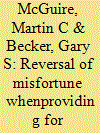| Srl | Item |
| 1 |
ID:
105867


|
|
|
|
|
| Publication |
2011.
|
| Summary/Abstract |
That progressive taxation might offset a disproportionate burden of indirect taxes upon low income households sits at the heart of a suggestion from Friedrich Hayek. This concerns the manner in which a degree of progression might be accommodated and constrained to preclude arbitrary tax hikes upon minority income groups. While Hayek's proposal is permissive of socialist aims, it looks for efficiency in resource usage as reflected in the aspiration 'that each should feel that in the aggregate all the collective goods which are applied to him are worth at least as much as the contribution he is required to make'.
|
|
|
|
|
|
|
|
|
|
|
|
|
|
|
|
| 2 |
ID:
075803


|
|
|
|
|
| Publication |
2006.
|
| Summary/Abstract |
Often an economic agent dissatisfied with an endowed distribution of utilities desires to optimize this distribution by transferring income or resources across individuals or states of the world. This multi?state optimization theme recurs in a wide variety of economic contexts, ranging across taxation and income distribution, international trade and market disruption, labor contracts and unemployment insurance, Rawlsian design of social contracts, provision for retirement, and many others. Because analyses of such topics are frequently so context driven, the generality of this theme seems to have gone unnoticed and, of a particular paradoxical result, unappreciated. One example of this paradox is how lump?sum distribution in a first best environment will reverse the preference rankings of the endowed distribution of utilities - after redistribution the originally 'bad' outcomes become preferred to originally better ones. Or as another example, if fair insurance is available, the rational resource owner will buy so much insurance that the otherwise 'bad' contingency becomes preferred. This paper examines the underlying structure common to such contexts.
|
|
|
|
|
|
|
|
|
|
|
|
|
|
|
|